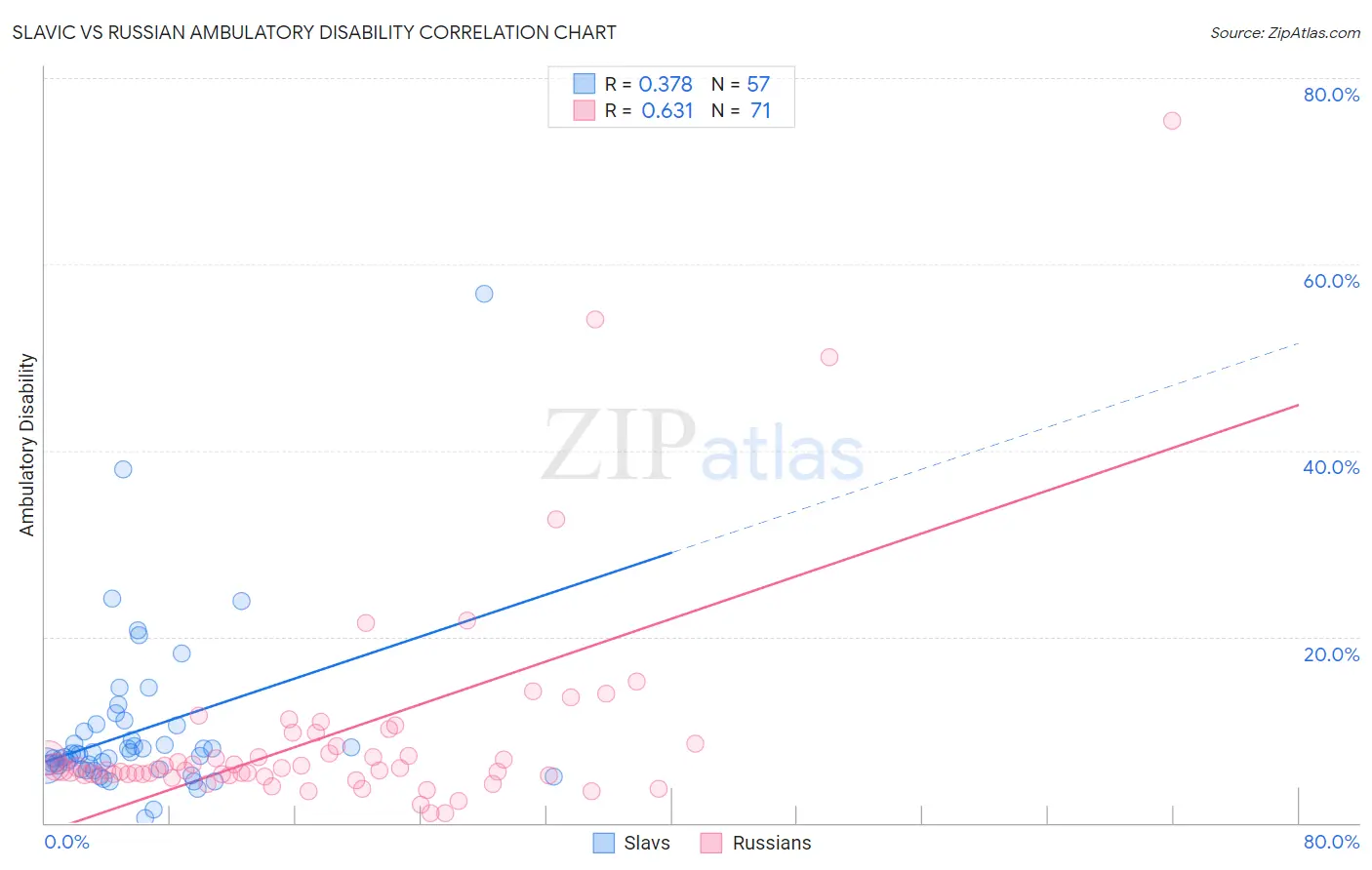Slavic vs Russian Ambulatory Disability
COMPARE
Slavic
Russian
Ambulatory Disability
Ambulatory Disability Comparison
Slavs
Russians
6.4%
AMBULATORY DISABILITY
5.1/ 100
METRIC RATING
226th/ 347
METRIC RANK
5.9%
AMBULATORY DISABILITY
93.4/ 100
METRIC RATING
118th/ 347
METRIC RANK
Slavic vs Russian Ambulatory Disability Correlation Chart
The statistical analysis conducted on geographies consisting of 270,841,437 people shows a mild positive correlation between the proportion of Slavs and percentage of population with ambulatory disability in the United States with a correlation coefficient (R) of 0.378 and weighted average of 6.4%. Similarly, the statistical analysis conducted on geographies consisting of 511,917,360 people shows a significant positive correlation between the proportion of Russians and percentage of population with ambulatory disability in the United States with a correlation coefficient (R) of 0.631 and weighted average of 5.9%, a difference of 7.6%.

Ambulatory Disability Correlation Summary
| Measurement | Slavic | Russian |
| Minimum | 0.58% | 1.0% |
| Maximum | 56.8% | 75.4% |
| Range | 56.3% | 74.4% |
| Mean | 9.9% | 9.5% |
| Median | 7.4% | 5.8% |
| Interquartile 25% (IQ1) | 6.0% | 5.2% |
| Interquartile 75% (IQ3) | 10.2% | 8.5% |
| Interquartile Range (IQR) | 4.2% | 3.3% |
| Standard Deviation (Sample) | 8.9% | 11.9% |
| Standard Deviation (Population) | 8.8% | 11.9% |
Similar Demographics by Ambulatory Disability
Demographics Similar to Slavs by Ambulatory Disability
In terms of ambulatory disability, the demographic groups most similar to Slavs are Honduran (6.3%, a difference of 0.27%), Cuban (6.4%, a difference of 0.33%), Portuguese (6.4%, a difference of 0.34%), Czechoslovakian (6.4%, a difference of 0.39%), and Liberian (6.3%, a difference of 0.44%).
| Demographics | Rating | Rank | Ambulatory Disability |
| Indonesians | 9.9 /100 | #219 | Tragic 6.3% |
| Immigrants | Albania | 9.6 /100 | #220 | Tragic 6.3% |
| Hungarians | 9.6 /100 | #221 | Tragic 6.3% |
| German Russians | 9.4 /100 | #222 | Tragic 6.3% |
| Immigrants | Honduras | 7.6 /100 | #223 | Tragic 6.3% |
| Liberians | 7.1 /100 | #224 | Tragic 6.3% |
| Hondurans | 6.3 /100 | #225 | Tragic 6.3% |
| Slavs | 5.1 /100 | #226 | Tragic 6.4% |
| Cubans | 4.0 /100 | #227 | Tragic 6.4% |
| Portuguese | 4.0 /100 | #228 | Tragic 6.4% |
| Czechoslovakians | 3.8 /100 | #229 | Tragic 6.4% |
| Mexicans | 3.5 /100 | #230 | Tragic 6.4% |
| Panamanians | 3.1 /100 | #231 | Tragic 6.4% |
| Assyrians/Chaldeans/Syriacs | 2.4 /100 | #232 | Tragic 6.4% |
| Sub-Saharan Africans | 2.3 /100 | #233 | Tragic 6.4% |
Demographics Similar to Russians by Ambulatory Disability
In terms of ambulatory disability, the demographic groups most similar to Russians are Immigrants from South Eastern Asia (5.9%, a difference of 0.040%), Norwegian (5.9%, a difference of 0.080%), Estonian (5.9%, a difference of 0.11%), Costa Rican (5.9%, a difference of 0.18%), and Icelander (5.9%, a difference of 0.18%).
| Demographics | Rating | Rank | Ambulatory Disability |
| Danes | 96.6 /100 | #111 | Exceptional 5.8% |
| South Africans | 96.3 /100 | #112 | Exceptional 5.9% |
| Immigrants | Uruguay | 95.6 /100 | #113 | Exceptional 5.9% |
| Immigrants | Poland | 95.4 /100 | #114 | Exceptional 5.9% |
| South American Indians | 94.8 /100 | #115 | Exceptional 5.9% |
| Immigrants | Africa | 94.7 /100 | #116 | Exceptional 5.9% |
| Immigrants | South Eastern Asia | 93.6 /100 | #117 | Exceptional 5.9% |
| Russians | 93.4 /100 | #118 | Exceptional 5.9% |
| Norwegians | 93.1 /100 | #119 | Exceptional 5.9% |
| Estonians | 92.9 /100 | #120 | Exceptional 5.9% |
| Costa Ricans | 92.6 /100 | #121 | Exceptional 5.9% |
| Icelanders | 92.6 /100 | #122 | Exceptional 5.9% |
| Immigrants | Russia | 92.4 /100 | #123 | Exceptional 5.9% |
| Immigrants | Middle Africa | 92.2 /100 | #124 | Exceptional 5.9% |
| Koreans | 91.6 /100 | #125 | Exceptional 5.9% |